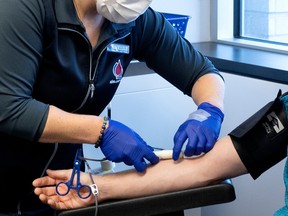In 2018, people between the ages of 18 and 29 represented 31 per cent of registered donors. Five years later, it dropped to 21 per cent.

The number of young people donating blood has been declining in Quebec over the past five years, presenting a challenge for Héma-Québec, which must continually make efforts to successfully fill its blood bank.
As the population ages, some regular donors are retiring from donating blood for all kinds of reasons — for example, if they start taking certain medications that exclude them as a donor or they become ill.
Hence the importance of having a succession of donors because the needs are not decreasing. In Quebec, every 80 seconds a person needs blood and to meet this demand a minimum of 1,000 donations per day must be collected.
In 2018, people between the ages of 18 and 29 represented 31 per cent of registered donors. Five years later, it dropped to 21 per cent, according to the most recent data from Héma-Québec.
Among new donors, that is to say any adult who decides to give blood for the first time, Héma-Québec observed a significant drop during the pandemic, but has since recovered.
In 2018, the organization that manages blood collection in Quebec reported 22.4 per cent of registered donors who raised their sleeve for the first time. The rate dropped to 14 per cent at the height of the COVID-19 pandemic. Currently, one in five registered donors is giving blood for the first time.
It is important to have “new blood” every year to ensure the sustainability of the supply, said Héma-Québec spokesperson Josée Larivée. It is also necessary to secure the organization’s capacity to meet hospital demand.
“Our blood bank in Quebec is doing relatively well,” Larivée said. “We are still quite happy. We can be proud of the generosity of Quebecers, but when we look to the future, we say: 18-to-30-year-olds, we have to get on board. You have to ask yourself why you don’t give blood and if you could try to become a new donor.”
Larivée said the weekly demand from hospitals “sometimes slightly exceeds our daily harvests … so much so that the reserve is dwindling, a situation that we are taking charge of through calls for donations.”
Summer, however, represents a precarious period since appointments are more difficult to fill, among other things because of vacations.
The spokesperson clarified that Héma-Québec prioritizes vigilance, which has allowed the non-profit organization to never run out of blood in its 25 years of existence.
Larivée is also encouraged by the 400 more Quebecers than usual who decided to make a donation during National Blood Donor Week, which ended on June 16.
Héma-Québec continues its blood collections across Quebec. It notes the O negative group is a universal donor, which is essential for emergency relief, but all blood types are accepted.
Canadian Press health coverage receives funding through a partnership with the Canadian Medical Association. CP is solely responsible for this content.